News
26 Top Blockchain Applications and Use Cases in 2024
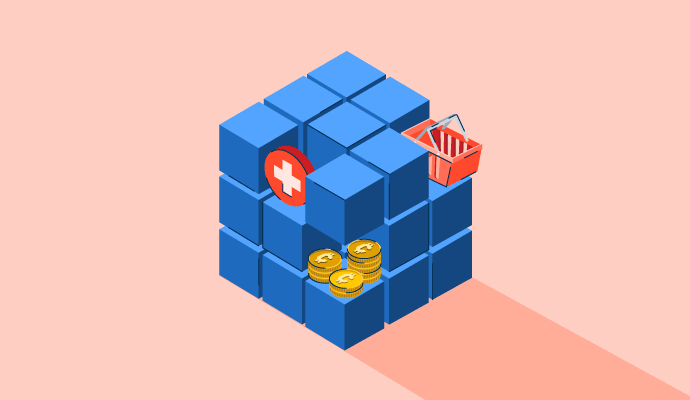
When trust meets technology, you get blockchain.
Blockchain technology has been a game changer for transacting, sharing information, and defining trust in the rapidly evolving digital world. Blockchain platforms serve as a digital database or ledger system that fosters transparency and accountability in a business network by recording transactions and tracking assets.
While blockchain applications have been largely associated with cryptocurrency software and bitcoins, the technology has the power to revolutionize several industries by offering secure and decentralized solutions.
What are the top applications of blockchain technology?
Blockchain technology is being used across almost every industry, including:
- Cryptocurrency
- Healthcare
- Finance and banking
- Real estate
- Retail
- Supply chain and logistics
- Insurance
- Voting and governance
- Internet of Things (IoT)
- Media and advertising
Businesses can build applications of blockchain for any purpose, like digital payments or supply chain, through blockchain platforms, often hosted by blockchain as a service providers. This distributed ledger technology (DLT) redefines how we operate in the digital economy by establishing trust and security for all.
How does blockchain work?
Blockchain is a decentralized digital ledger system that records and verifies transactions and information across a network of computers called nodes. Its core components comprise decentralization, transparency, immutability, and automation.
If we break down the term blockchain, we get block and chain. So to understand how it works, imagine a chain of blocks, where each block represents a data set. These blocks are connected in a distinct order to create a continuous chain.
Each node maintains a copy of the entire blockchain to ensure that the information is consistent and not controlled by a single commodity. This means that once a block is added to the chain, it’s difficult for any single entity to manipulate the stored data without alerting everyone in the blockchain network.
This secure data distribution is possible through a hash, which is generated from a cryptographic hashing algorithm. Hash is a digital fingerprint unique to each block and ensures that any slight change in the block’s data would result in a completely different hash.
Furthermore, to add a new block to the blockchain, its authenticity has to be validated via consensus. Consensus is a mechanism that ensures there are no discrepancies in the state of the distributed ledger. It’s essential in maintaining the integrity of the blockchain. Once consensus validates the block, it’s added permanently to the blockchain. This action is then distributed across all nodes to update their copies.
Now that we’re clear on how blockchain works, let’s dive deep into some of the applications of blockchain technology across different industries and sectors.
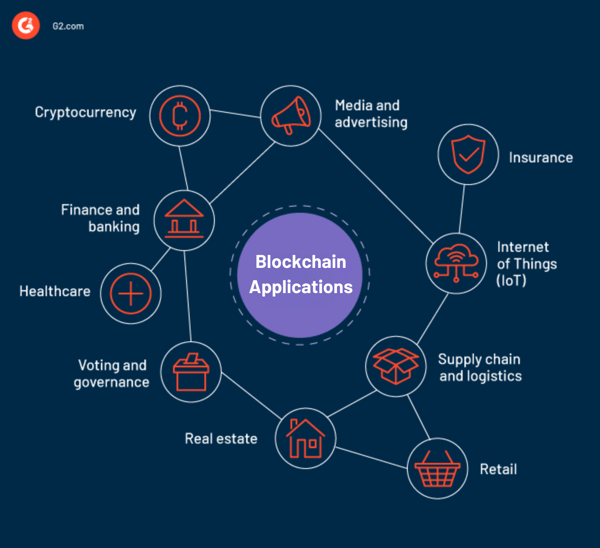
Blockchain applications in healthcare
By embracing blockchain solutions, healthcare providers can modernize operations, maintain data integrity, and enhance patient care. Blockchain doesn’t encounter privacy breaches like traditional methods, where the risk of unauthorized access exists. It also enables secure data interoperability in real time, reducing administrative inefficiencies.
Here’s a look into what blockchain applications in healthcare comprise.
1. Secure electronic health records (EHRs)
Medical professionals can’t access complete patient history when patient data gets siloed. To overcome this problem, a blockchain-based system is linked to existing EHR software. The decentralized system stores and manages EHRs securely and provides a single view of a patient’s record. It also gives patients the freedom to approve changes to their EHRs, authorize who can view them, and control how they are shared by healthcare providers.
2. Clinical trial research
Clinical trials and continuous medical research are part of what takes a healthcare system to the next level. However, such initiatives are often burdened with data integrity issues. The blockchain serves as the single source of truth for research and trial data. It improves and secures record keeping and sharing while maintaining patient privacy.
Blockchain also asserts ethical checkpoints to ensure the trial is completed while staying compliant.
3. Pharmaceutical supply chain management
One of the persistent challenges in the healthcare industry is confirming the authenticity of medicines and pharmaceutical products. Blockchain offers visibility into each stage of the supply chain, enabling complete visibility and traceability of medical goods.
In a sector where counterfeit products cause thousands of deaths every year, the implementation of blockchain is one of the most secure and legit solutions to prevent such circumstances.
4. Verification of staff credentials
Similar to blockchain applications in supply chain management, the technology can track the records and credentials of medical professionals to streamline hiring processes. Trusted medical records with staff credentials are accessible to other healthcare organizations as needed. This practice enforces transparency when sharing staff details with patients.
5. Remote patient monitoring
Patient monitoring solutions have created one of the biggest shifts in the medical world. Healthcare practitioners are using advanced sensors to measure patients’ vital signs to provide enhanced preventative and proactive care remotely.
Blockchain supports it by providing encrypted communication and securing such devices from cyberattacks tampering with personal data.
Blockchain applications in finance and banking
Blockchain technology lies at the heart of the digital transformation in banking. It has evolved from crypto to securing loans, digital transactions, and online payments. It has become one of the most widely used technologies in fintech. Blockchain in banking and financial services enables efficient processes, reduced costs, and secure networks.
Check out some of the most common blockchain applications in finance and banking.
6. Smart contracts
Smart contracts software is built on blockchain-based platforms that automate the execution of agreements, reducing the need for intermediaries. They permit trusted transactions and agreements between two parties without a central authority. Smart contracts have several uses, including real estate, trading, healthcare, supply chain, and dispute resolution.
7. Digital currencies
With blockchain enabling and normalizing the use of digital currencies, financial trading, and transactions are much faster and more secure than ever. It has also paved the way for the development of central bank digital currencies (CBDCs).
Furthermore, this new and efficient framework of digital assets exchange has opened the possibility of digital currencies becoming standard in the future.
8. Cross-border payments
By providing real-time tracking and secure payment gateways, blockchain has made cross-border payments faster, safer, and highly cost-effective. By reducing the element of a middleman and transaction fees, blockchain has enabled banks and customers to transact more frequently.
9. Regulatory compliance
Blockchain provides transparent and auditable records of digital transactions, which helps financial institutions meet regulatory requirements. Banks can also intercept suspicious transactions and digital banking activities on time by streamlining the auditing process with blockchain technology.
10. Asset management
There are many ways through which blockchain solutions make asset management more advanced. It digitizes the portfolio and existing holdings for wider market access, liquidity, and ease of transfer. Blockchain also improves investor and stakeholder governance through customizable built-in privacy settings.
Blockchain applications in real estate
Businesses and professionals are becoming increasingly cognizant of blockchain applications in the real estate sector. It can transform property management and sales, optimize payments, and increase investment opportunities.
Here’s a look into the different uses of blockchain in real estate.
11. Fractional ownership and asset tokenization
Through blockchain, the process of real estate investment is repurposed, allowing investors to buy and sell fractional shares instead of pooling all their money to acquire property. Asset tokenization platforms built on blockchain let you create a digital token of ownership for real-world liquid assets. Once assets are tokenized, investors only need a trading app to execute borderless international trading.
12. Loan and mortgage security
Blockchain solves many challenges that come with paper documentation for loans and mortgages. Digitization of such documents provides access to critical information that supports future decisions like ownership rights and loan payment history.
Blockchain payment systems enable the use of smart contracts that automate the collection and distribution of payment along with real-time reporting.
13. Land registration
By letting go of the paper system, blockchain serves as the single resource in the form of an immutable ledger system. It tracks and updates any changes in the database, including land titles, boundaries, and land use planning. The digitization of such processes eliminates any excessive administrative costs and prevents fraudulent transactions.
14. Property management
Large-scale enterprises and startups often lack oversight of their portfolio. Blockchain in real estate secures data sharing and payment processes, providing effective due diligence across the global portfolio. It also simplifies all property management communication between owners, tenants, and service providers.
15. Urban planning
Any form of property development can’t happen without feedback from the community. However, people often feel deprived of the planning process or unable to express their preferences. Through blockchain, platforms can focus on providing educational resources and create an effective feedback loop between stakeholders to establish engagement and communication.
Blockchain applications in retail
In retail, blockchain acts as a tool for establishing trust between retailers, consumers, supply chain participants, and payment gateways. Blockchain’s ability to amplify the tracking and digitization of processes has been beneficial to the retail industry, especially during the pandemic.
Let’s break down the use of blockchain in retail below.
16. Inventory management
To improve overall efficiency, retailers need to be on top of their inventory management game. Blockchain makes this process more efficient by keeping track of the stock and expiration dates. It also automates the process of identifying product shortage or surplus, depending on consumer needs.
17. Supply chain management
By providing end-to-end visibility in the supply chain, blockchain allows all network participants to look into what’s happening in the system at any given time. It keeps track of everything throughout the product journey, addressing issues of supply chain discrepancies and lack of traceability.
18. Product authentication
Blockchain’s ability to verify product provenance has helped companies combat counterfeiting by identifying its proof of origin. By scanning blockchain-based radio frequency identification (RFID) tags, customers can extract details about the manufacturing process of a product, along with its ingredients and certifications.
19. Protection against cyber attacks
The issue of data privacy is common in every industry, and retail is no exception. Blockchain increases customer data security by storing encrypted data, which prevents unauthorized access or other cybersecurity breaches. This also benefits companies by gaining customer trust, which ultimately adds up to higher revenue.
20. Transparent product reviews
Another aspect of gaining customer trust is blockchain-based review systems. These systems are secured against unauthorized tampering and generate authentic reviews from customers. Trusted customer feedback builds credibility for the brand, resulting in increased customer loyalty and engagement.
Other applications of blockchain
Here are some more examples of blockchain applications across industries.
21. Voting and governance: Blockchain-based voting systems enhance the security and transparency of elections. Each vote is tamper-proof and auditable for easy verification and validation. Therefore, blockchain rids the system of voter fraud and any kind of data manipulation.
22. Intellectual property management: Blockchain supports the registration of intellectual property rights by making the process faster, more accurate, cost-effective, and secure. Non-fungible tokens (NFTs) are built on the ethereum blockchain and add visibility of ownership and ease of trading for digital assets.
23. Energy trading: Blockchain technology combined with IoT devices enables consumers to trade and purchase energy directly from the grid rather than from retailers. It also provides an immutable record of meter readings, energy generation, and consumption data.
24. Insurance: With blockchain, insurance companies streamline all the processes, including claims processing, fraud detection, and underwriting. It also supports customer data protection by storing policy data in a tamper-proof ledger system, which improves accountability and trust.
25. Education: Educational institutions can verify candidate credentials and certifications through blockchain. They can access and share this data securely with authorized personnel, giving them full control. Also, blockchain can develop decentralized e-learning content software for securing educational content ownership.
26. Media and entertainment: While the media and entertainment industry is yet to utilize the full potential of blockchain, the technology helps artists and content creators get their dues, both in terms of revenue and copyrights. It also offers support for tackling piracy and fraud.
Think inside the blocks
Blockchain has immense potential for every industry out there. From cryptocurrencies to voting systems, blockchain has a broad spectrum of use cases that transform the way we have been functioning for years. It’s like a digital superpower that supports every sector and leaves it better than ever by breaking it free from flawed traditional systems.
And this is just the beginning. Blockchain will continue to evolve and transform the digital world, one block at a time. As technologies like artificial intelligence, machine learning, and big data become more efficient over the coming years, technology will converge with human creativity to present countless possibilities.
Make your blockchain ecosystem immune to cyber threats by using the best blockchain security software.
News
Blockchain Technology Will Transform Water Access and Management Globally

Disclosure: The views and opinions expressed here are solely those of the author and do not represent the views and opinions of the crypto.news editorial team.
Access to clean water is a basic human need, yet billions of people around the world still struggle to get it. According to the World Health Organization, over 2 billion people live in countries suffering from severe water stress, and this number is expected to continue to grow due to climate change and population growth.
Traditional water management systems have struggled to address these challenges, often hampered by inefficiencies, lack of transparency, and misallocation of resources. Blockchain technology offers a promising solution to these challenges, providing equitable access and sustainable use of this crucial resource.
The current state of water management
Water management today faces several pressing issues. Inefficiencies in water supply, distribution, and use, coupled with a lack of real-time monitoring, often result in resource waste and misallocation. Many water sources fail to realize their full potential due to infrastructure and financing shortfalls. For example, the Environmental Protection Agency (EPA) report indicated that the United States would need to invest $625 billion over the next 20 years to repair, maintain and improve the country’s drinking water infrastructure due to aging pipes and other infrastructure problems. Additionally, in the United States alone, household leaks can to waste nearly 900 billion gallons of water per year nationwide. This is equivalent to the annual domestic water consumption of nearly 11 million homes.
Furthermore, corruption and mismanagement of water resources can cause unequal distribution, with disadvantaged communities often bearing the brunt of water scarcity. For example, South Africa is struggling with myriad challenges to its water security: drought, inadequate water conservation measures, outdated infrastructure, and unequal access to water resources. The country faces significant water scarcity, with demand expected to outstrip supply by 2030, creating a projected gap of 17%.
Furthermore, the global water industry is highly monopolized, with a few key players controlling a significant share of the market. These companies exert substantial influence over the water supply chain, often prioritizing profit over equitable distribution and environmental responsibility. This concentration of power can lead to inflated prices and limited access for vulnerable populations. The global bottled water market alone is projected to reach $509.18 billion by 2030, with these large companies capturing a significant share of revenue. This monopolization exacerbates existing inequalities in water access and highlights the need for more decentralized and community-driven water management solutions.
Source: Grand View Search
The potential of blockchain in water management
Blockchain technology can address these issues by providing a transparent, secure, and decentralized platform for water resource management. This approach offers several advantages:
- Transparency and accountability. Blockchain’s immutable ledger ensures that all transactions and data entries are transparent and cannot be changed once recorded. This transparency can reduce corruption and ensure that water resources are allocated fairly and efficiently. For example, blockchain can be used to track water usage from source to end user, providing a clear record of how water is distributed and used. This level of transparency can help hold authorities accountable and manage water resources sustainably.
- Efficient resource management. Blockchain can facilitate the creation of smart contracts, which are self-executing contracts with the terms of the agreement written directly into the code. These contracts can automate water distribution based on real-time data, directing water to where it is needed most. For example, smart contracts could be used to manage urban water supply systems, automatically adjusting water distribution based on real-time consumption patterns and demand. This can help optimize water use, reduce waste, and ensure that households and businesses receive the right amount of water at the right time.
In Dubai, the Dubai Electricity and Water Authority (DEWA) has implemented a blockchain-based smart water network initiative as part of its broader smart city strategy. This project integrates blockchain technology with IoT sensors to monitor water usage in real time, manage distribution, and detect leaks. The decentralized ledger ensures data integrity and transparency, enabling more efficient water management and reduced waste. DEWA’s initiative aims to improve sustainability and resource management in the rapidly growing city, highlighting the potential of blockchain to support urban water management and conservation efforts.
Community participation and ownership
Through blockchain, individuals can directly control and monetize their access to water resources, eliminating the need for third-party intermediaries. This direct control model allows local communities to make collective and transparent decisions about their water use. By managing their water directly from the source, communities can tailor water management practices to their specific needs, promoting equitable distribution and encouraging a sense of accountability and stewardship.
Additionally, future models could allow people to monetize their access to water through web3 technologies. For example, a community-to-business (C2B) model could allow people to sell water directly to companies. In this model, people do not have to own the water directly, but can profit by staking their tokens during event sales pools. This approach not only supports sustainable water management, but also creates economic opportunities for community members. Additionally, a “Burn to Secure” protocol can be used to provide water allocation rights. This protocol provides a true sense of water security and financial opportunity by allowing people to redeem their rights. This system not only secures future water allocations, but also increases token scarcity and value.
Additionally, a pure sense of investment is achieved through investments in water sources. This leads to potential financial returns and dividends by addressing the inefficiencies in water supply mentioned above. By investing to finance infrastructure projects, such as building factories and improving distribution systems, more water can be brought to communities, creating additional economic opportunities.
Monetizing water access through the C2B model, the “Burn to Secure” protocol, and investments in water sources all generate economic benefits for the community, promoting a more equitable and efficient water management system.
Overcoming challenges
While blockchain technology has the potential to improve water management, there are challenges to its adoption. The complexity of blockchain systems and the need for technological infrastructure can be barriers, especially in developing regions. Additionally, there are concerns about the significant energy consumption of blockchain networks. However, technological advances and the development of more energy-efficient blockchain solutions are helping to alleviate these concerns. Additionally, education and capacity building are key to ensuring stakeholders understand how to effectively use blockchain technology. Governments, NGOs, and private sector partners need to work together to provide training and support to communities and water management authorities.
Blockchain technology offers a practical and effective means to improve water management. In addition to addressing inefficiencies, blockchain empowers communities, promotes sustainable practices, and opens up new economic opportunities through models like community-to-business (C2B). As we face the growing challenges of climate change and population growth, blockchain is not only an innovative solution, but represents a fundamental shift in the way we manage and value water resources. Adopting blockchain in water management is essential to creating a sustainable and equitable future by changing the way we interact with and protect our most vital resource.

Jean-Hugues Gavarini
Jean-Hugues Gavarini is the CEO and co-founder of LAKE (LAK3), a real-world asset company leveraging blockchain technology to decentralize access to the global water economy. LAKE aims to ensure access to clean water for all, protect water resources, and deliver water to those in need through innovative technologies. Jean-Hugues has a diverse career spanning the luxury, fashion, and footwear industries. His career path includes notable successes at Mellow Yellow, Cremieux, and Tod’s. Raised between Silicon Valley and the French Alps, Jean-Hugues has always been immersed in technology and freshwater resources. In 2018, Jean became the CEO of Lanikea Waters, a water solutions entity based in the French Alps. In 2019, the concept of LAKE was born, embodying his commitment to innovation and sustainability.
News
Blockchain and AI Expo 2024
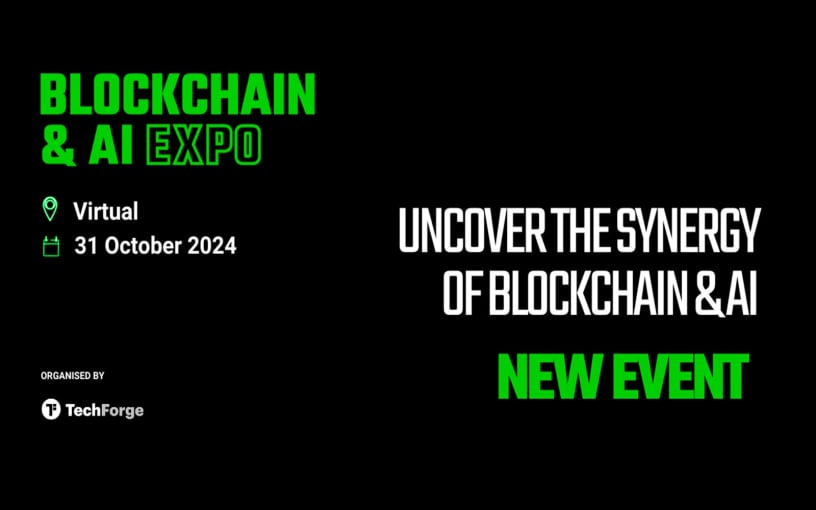
With rapid advances in the world of AI and blockchain, there are opportunities to leverage the security and transparency features of blockchain to improve the reliability and trust of AI systems and data transactions.
Explore the synergy of these advanced technologies in virtual mode Blockchain and AI Expowhich takes place on October 31, 2024 TO 10:00 GMT.
The event features cutting-edge presentations led by leading experts in evolving fields. Presentations are set to explore opportunities and challenges in the fusion of blockchain and AI, real-world applications, ethics, innovations in environmental sustainability, and more!
Gain a comprehensive understanding of how these technologies can synergistically drive innovation, optimize operations, and promote strategic growth opportunities. Develop your knowledge to facilitate informed decision making and give your company a competitive edge in the growing technology landscape.
News
Nigeria Eyes National Blockchain Nigerium for Data Sovereignty
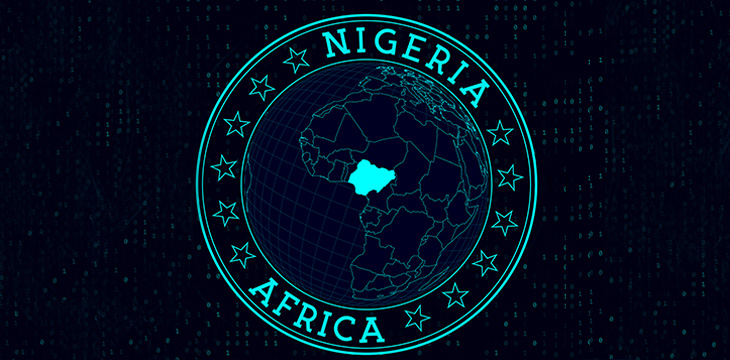
Nigeria is keeping an eye on a new native blockchain network to protect the country’s data sovereignty.
According to local media, a team from the University of Hertfordshire has proposed the new blockchain, Nigeriato the National Information Technology Development Agency (NITDA).
Chanu Kuppuswamy, who leads the team, argued that relying on blockchain networks whose developers are located in other regions poses national security risks to the Nigerian government. He further said that Nigerium would allow the West African nation to customize the network to meet specific needs, while also promoting data sovereignty.
In his presentation, Chanu cited the recent migration of Ethereum to test of participation (PoS) consensus as an instance in which no Nigerians were involved but whose impact is far-reaching.
“Developing an indigenous blockchain like Nigerium is a significant step towards achieving data sovereignty and promoting trust in digital transactions in Nigeria,” he said.
While receiving the proposals in Abuja, NITDA’s Kashifu Abdullahi acknowledged the benefits a local blockchain would bring to Nigeria, including increased security of citizens’ data.
However, a NITDA spokesperson later clarified that Nigerium is still at the proposal stage and that the government has not yet decided whether to proceed or not.
“The committee is still discussing the possibility with stakeholders. Even if a decision is finally made, there is no guarantee that the name will be Nigerium,” the spokesperson told the media.
Nigerium’s reception in the country has been mixed. Some, like financial analyst Olumide Adesina, To say the network is “dead on arrival”. He believes the Nigerian government’s poor record in following through on its big technology plans will claim another victim. He pointed to the eNaira as a missed opportunity whose chances of success were much higher than those of Nigerium.
Others welcomed the proposal. Chimezie Chuta, who chairs the renewed The Nigerian Blockchain Policy Committee is “extremely optimistic“that Nigerium will be more successful than eNaira.
Speaking to a local news agency, Chuta stressed that eNaira failed because the central bank initiated the project on its own, without involving any stakeholders.
“They just cooked it and expected everyone to like it. [With Nigerium]there will be a lot of collaboration,” he said.
Registration of property title, digital identity and Certificate Verification are among the use cases that Nigerium is expected to initially target. However, Nigeria has already made progress in some of these fields through public blockchains.
SPPG, a leading school in governance and politics, announced in May the country’s first blockchain certificate verification system. Built on the The BSV BlockchainIt was developed in collaboration with the blockchain data recording company VX Technologies and local lender Sterling Bank.
Watch: The Future Has Already Arrived in Nigeria
 Italian: https://www.youtube.com/watch?v=M40GXUUauLU width=”560″ height=”315″ frameborder=”0″ allowfullscreen=”allowfullscreen”>
Italian: https://www.youtube.com/watch?v=M40GXUUauLU width=”560″ height=”315″ frameborder=”0″ allowfullscreen=”allowfullscreen”>
New to blockchain? Check out CoinGeek Blockchain for Beginners section, the definitive guide to learn more about blockchain technology.
News
Cambodian CBDC Developer to Build Palau Bond Market on Blockchain: Report

A Japanese fintech developer will build a blockchain-based bond market gateway for Palau, aiming to launch a trial in 2024 and a full launch the following year.
Japanese fintech developer Suramitsubest known for developing a central bank digital currency (CBDC) for Cambodia, is intended to build a Blockchain-gateway to the bond market based on the Pacific island nation of Palau, Nikkei He learned.
Soramitsu won the contract and plans to introduce the market on a trial basis in fiscal 2024, with a full launch scheduled for the following year, allowing the Palauan government to issue bonds to individual investors and efficiently manage principal and interest payments, according to the report.
The total cost of the project is estimated at several hundred million yen ($1.2 million to $5.6 million), less than half the cost of a non-blockchain alternative, people familiar with the matter said. The project has reportedly received support from Japan’s Ministry of Economy, Trade and Industry, with Japan’s foreign and finance ministries providing strategic and management advice on the project.
Soramitsu’s successful development of Cambodia’s CBDC in 2020 has boosted its reputation, with the digital currency’s popularity soaring, with over 10 million accounts opened by December 2023, representing 60% of Cambodia’s population. Following this, Cambodia’s central bank governor Chea Serey indicated intends to expand the reach of its CBDC internationally, particularly through collaboration with UnionPay International, the Chinese card payment service, and other global partners.
While Soramitsu’s work in Cambodia has been well received, the long-term popularity of CBDCs remains to be seen. As of late June, crypto.news reported a sharp drop in activity in India’s digital currency, the e-rupee, after local banks stopped artificially inflating its values.
According to people familiar with the matter, the Reserve Bank of India managed to hit the 1 million retail transaction milestone last December only after the metrics were artificially infiltrated by local banks, which offered incentives to retail users and paid a portion of the bank’s employees’ salaries using the digital currency.
-

 News1 year ago
News1 year ago“Captain Tsubasa – RIVALS” launches on Oasys Blockchain
-

 Ethereum1 year ago
Ethereum1 year agoComment deux frères auraient dérobé 25 millions de dollars lors d’un braquage d’Ethereum de 12 secondes • The Register
-

 News1 year ago
News1 year agoSolana ranks the fastest blockchain in the world, surpassing Ethereum, Polygon ⋆ ZyCrypto
-

 Videos1 year ago
Videos1 year agoHistoric steps for US cryptocurrencies! With a shocking majority vote!🚨
-

 Videos1 year ago
Videos1 year agoIs Emorya the next gem💎 of this Bitcoin bull run?
-

 News1 year ago
News1 year agoSolana Surpasses Ethereum and Polygon as the Fastest Blockchain ⋆ ZyCrypto
-

 Videos1 year ago
Videos1 year agoNexus Chain – Ethereum L2 with the GREATEST Potential?
-
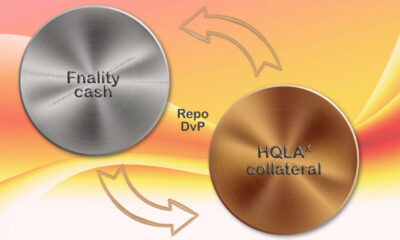
 News1 year ago
News1 year agoFnality, HQLAᵡ aims to launch blockchain intraday repositories this year – Ledger Insights
-

 Ethereum1 year ago
Ethereum1 year agoScaling Ethereum with L2s damaged its Tokenomics. Is it possible to repair it?
-
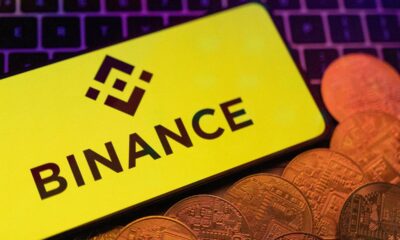
 Regulation1 year ago
Regulation1 year agoFinancial Intelligence Unit imposes ₹18.82 crore fine on cryptocurrency exchange Binance for violating anti-money laundering norms
-

 Bitcoin1 year ago
Bitcoin1 year agoBitcoin Drops to $60K, Threatening to Derail Prices of Ether, Solana, XRP, Dogecoin, and Shiba Inu ⋆ ZyCrypto
-

 News1 year ago
News1 year agoSendBlocks Debuts with Major Support to Improve Blockchain Data Management










